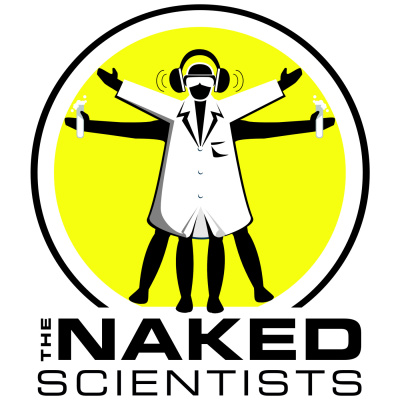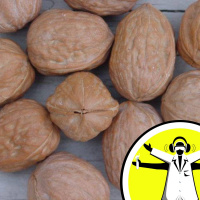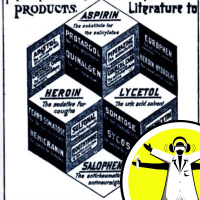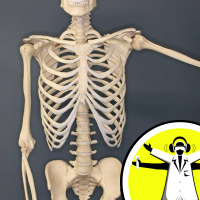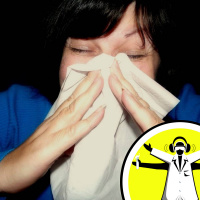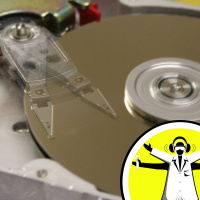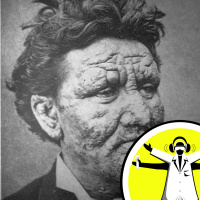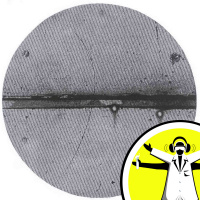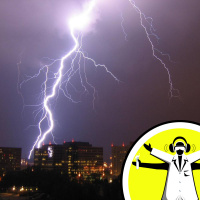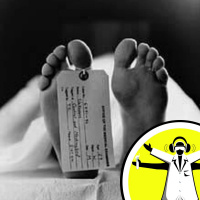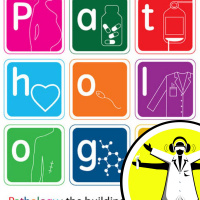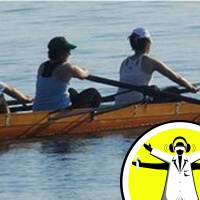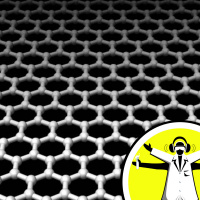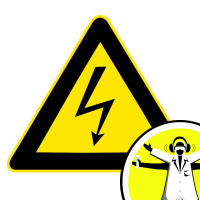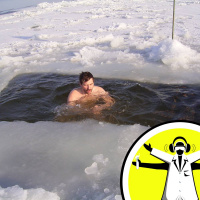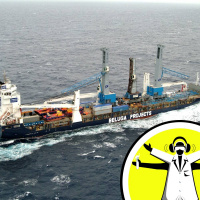Sinopsis
The Naked Scientists flagship science show brings you a lighthearted look at the latest scientific breakthroughs, interviews with the world's top scientists, answers to your science questions and science experiments to try at home.
Episodios
-
Life Where the Sun Don't Shine...
27/03/2011 Duración: 57minLife in inaccessible places - including in caves sealed off from the Sun and around deep-sea vents - is the subject of this week's Naked Scientists. In these intriguing environments, bacteria replace plants as the primary producers, extracting energy from the minerals around them to sustain a whole ecosystem. We also hear about the bone-eating worms that make a meal of whale carcasses that fall to the seafloor, an engineering trick for separating mined-metals from mud and, in the news, why the world's waves are getting bigger, how sperm can be grown in a dish and a gene that drives melanoma.... Like this podcast? Please help us by supporting the Naked Scientists
-
Beyond the Universe - Multiverses and More
20/03/2011 Duración: 56minThis week, we find out what lies beyond the limits of our Universe as we discuss multiverses, higher dimensions, string theory and supersymmetry. We find out how these ideas develop from basic principles and how the LHC can help to confirm, or refute, their existence. In the news, how quartz creates mountain ranges, progesterone excites sperm, and why birds can't help but fly into things. Plus, Meera and Dave find out how to engineer electrons to travel close to the speed of light, and Simon Singh explains how to discover the distance to a far away star. Like this podcast? Please help us by supporting the Naked Scientists
-
Why did a Laser Make My Nuts Glow?
13/03/2011 Duración: 01h02minCan you electrocute weeds? Why do teeth go wobbly? And which cells last a lifetime? In this bumper edition of the Naked Scientists, we tackle your pressing science questions and find out how the shuttle manoeuvres in space, what makes wounds itch, whether reverse osmosis can make moonshine and if static can stick a cat to a wall. Plus, how diamonds deal death to tumours, cooperation in the elephant world and an update on the Japanese earthquake situation. We also hear how a hairy leg can help you bend water to your will, and Diana discovers why potato peelers never need sharpening! Like this podcast? Please help us by supporting the Naked Scientists
-
Aspirin's Anniversary
06/03/2011 Duración: 55minFrom anti-ague to anti-Alzheimer's agent: over the 112 years since it was first trademarked, Aspirin has evolved from popular painkiller to powerful preventative against heart attacks, strokes and even cancer. In this week's show we trace its history from the extraction of aspirin-like chemicals from willow bark to the creation of the drug itself. Plus, in the news, how the chemistry of life could have come to Earth in a meteorite and why we need to be careful with stem cells: a new study finds they have an above-average mutation rate. Also, a new technique to etch graphene sheets with... Like this podcast? Please help us by supporting the Naked Scientists
-
Boosting Your Bones
27/02/2011 Duración: 58minJust the bare bones this week as we find out how exercise strengthens the skeleton and how new scanning techniques can help to pick up osteoporosis earlier and inform its management. We also try out a new gadget for measuring the force muscles can apply and, in the news, discover what a self-healing tumour can tell us about common cancers, evidence that mammalian hearts can repair themselves and a new laser-based tool for diagnosing melanoma. Plus, how the bones of people who died up to a hundred years ago are helping scientists to combat chronic back pain by building a computer model of the... Like this podcast? Please help us by supporting the Naked Scientists
-
Checking the Atmosphere and Changing the Climate
20/02/2011 Duración: 57minWe look to the skies in this week's Naked Scientists show, to uncover ways to monitor and change the chemistry of the atmosphere. We join researchers on board an air-sampling aeroplane to discover how atmospheric chemistry changes once the sun sets, and we discuss options for engineering the climate if things get too hot. In the news, the Ecuadorian population that may hold the genetic key to a disease-free life, and the rocks that move themselves around in Death Valley. Plus, a targeted muscle re-innervation strategy to afford amputees more powerful prosthetic control. Like this podcast? Please help us by supporting the Naked Scientists
-
What Makes Mucus Green?
13/02/2011 Duración: 01h07minHow do magnets multiply? What keeps an aeroplane in the air? How do wild animals avoid incest? It's open season on science questions in this week's Naked Scientists. We'll find out if oil extraction leaves a cavity, can cranberry juice cut urine infection rates and what happens when two lightning bolts collide? In the news, evidence of bipedalism in an early human ancestor, how oily fish helps avoid common causes of blindness and how smartphones are taking the pain out of cardiac rehabilitation. Plus, in Kitchen Science, the unexpected physics of a flying balloon. Like this podcast? Please help us by supporting the Naked Scientists
-
Low Energy, High-Power Processing
06/02/2011 Duración: 56minThis week we're getting inside the workings of the next generation of chips that are set to pack a bigger computing-punch but at a fraction of the energy-expenditure of todays' models: CTO Mike Muller joins us to explain the revolutionary technology that leading microprocessor-maker ARM is developing. Also, energy-efficient world-wide computing - we find out how distributing data-processing demands around the planet can turn waste energy into useful computations, simultaneously saving CO2 emissions, and in the news this week, a new malarial mosquito threat, rejection-free artificial blood... Like this podcast? Please help us by supporting the Naked Scientists
-
Leprosy: The Low Down
30/01/2011 Duración: 54minLeprosy goes under the microscope this week as we uncover the origins of one of the oldest known human diseases, recognised this week on World Leprosy Day. A quarter of a million new cases are diagnosed every year, but how is the illness spreading, what damage does it do to the body and can it be stopped? We also hear what archaeologists are unearthing about the history of leprosy and where it came from in the first place. Plus, why it's time to rethink the workings of the circadian clock, brain scans for bilingualism, cow-stomach bacterial genes for biofuels, and the engineering that lies... Like this podcast? Please help us by supporting the Naked Scientists
-
Analysing Antimatter
23/01/2011 Duración: 55minWe're analysing the matter of antimatter this week to find out what is antimatter, how is it made and why's it so rare in the Universe? We talk to researchers at CERN who are capturing anti-hydrogen so scientists can study it properly for the first time, and Dave and Meera call in to the hospital to hear how antimatter holds the key to better body scans. Diana discovers how gravity bends a beam of light and there's also news of a novel way to neutralise HIV, researchers uncover how brains gauge the passage of time, and agriculture on the microscale: scientists have found the world's smallest... Like this podcast? Please help us by supporting the Naked Scientists
-
Do Metal Spinal Implants Lure Lightning?
16/01/2011 Duración: 01h01minDoes a metal implant turn a person into a living lightning-conductor or radio receiver, is eye-size important, why is frost bad for freezers, where did the first organic molecules come from, what happens to sparkling drinks in space and why does a bump on the head make you see stars? This week, join Chris, Sarah and Dave as they pit their wits against the latest crop of your top questions. Plus, why making new computer chips looks set to become easy PC, how stem cells can get to the heart of Long QT Syndrome, feeding the world in 2050 and a new musical device to keep the drummer in the driving... Like this podcast? Please help us by supporting the Naked Scientists
-
Would you donate your body to science?
09/01/2011 Duración: 58minWe're discussing human dissection in this week's Naked Scientists. Chris visits the dissection room to find out how trainee doctors benefit from dissecting real bodies, and why many medical schools are increasingly turning to alternatives. We're joined by physician and film maker Paul Trotman, who followed the lives, and beyond, of three donors to explore the reasons why people choose to donate their bodies, and the impact the process had on the student's lives. In Naked Engineering, we find out how a design that copies the body's own structure and movements can make better artificial... Like this podcast? Please help us by supporting the Naked Scientists
-
National Pathology Week 2010
02/01/2011 Duración: 49minIn this special podcast we focus on the highlights of this year's National Pathology Week. We'll be going behind closed doors for a tour of the pathology labs at Great Ormond Street Hospital, and we'll explore the role of veterinary pathologists in diagnosing and treating animal disease. Like this podcast? Please help us by supporting the Naked Scientists
-
Back in the Saddle: Getting Paralysed Patients Riding and Rowing
26/12/2010 Duración: 17minIn this special episode of the Naked Scientists podcast, we explore the world of Functional Electrical Stimulation (FES), a technology allowing people paralysed from the waist down to row and cycle by using external electrodes to stimulate leg muscles. Michele Vanoncini investigates how it works, what benefits it can bring and talks to some of the people who have used the technique to go for gold... Like this podcast? Please help us by supporting the Naked Scientists
-
Blowing out Candles Round Corners
19/12/2010 Duración: 57minIn this festive episode, can you get drunk through your feet, the chemistry of cocktails, twelve marine critters of Christmas, the best food and drink combos to eschew indigestion, does a carbon fibre bike go faster, why are snowflakes different shapes and a way to impress your peers at the office party by blowing out candles round corners... Like this podcast? Please help us by supporting the Naked Scientists
-
Why's Graphene Great?
12/12/2010 Duración: 59minGraphene is the focus of this week's Naked Scientists, including how it holds the key to the super-flexible touch screen displays of tomorrow, super-light composites and the next generation of computer chips. In the news, a breakthrough in understanding Alzheimer's Disease, why glider pilots should be paying more attention to how falcons fly and why a new exoplanet has led astronomers to question current theories of planetary formation. Plus, we celebrate the first chunk of cheese to make it into orbit and ask if there's any evidence of a health benefit from wearing magnetic bracelets... Like this podcast? Please help us by supporting the Naked Scientists
-
Electrifying the Future
05/12/2010 Duración: 01h01minCurrent breakthroughs in electricity generation and distribution go under the spotlight in this week's sizzling edition of the Naked Scientists. We talk to the team with the electrical equivalent of cold-storage that can put power "on ice" until it's needed, and we hear how bright sparks in the UK are leading the charge to roll out "energy kiosks" to empower rural communities in Africa. We also check out a new form of small-scale turbine to extract power from rivers whilst minimising the environmental impact. In the news, why young people are more likely to fall victim to the flu, how a dose... Like this podcast? Please help us by supporting the Naked Scientists
-
Why do Men's Bits Shrink in the Cold?
28/11/2010 Duración: 01h20sHow heavy is the Earth? How do snakes digest huge meals? Should I fear falling bullets? We take on these questions and more in this Naked Scientists Question and Answer show! We'll discuss the ideal hair for head lice, the mechanics of using a straw and why men's bits shrink in the cold! In the news we explore the link between jetlag and forgetfulness, discover a moon with an oxygen atmosphere, and a new technique to tell someones age by their blood. Plus, in Kitchen Science we find out why a full carton is much harder to shake. Like this podcast? Please help us by supporting the Naked Scientists
-
Smart Pills: Drugs to Boost Brain Power
21/11/2010 Duración: 59minIQ-elevating agents that can boost brain power are being used by over 10% of university students. But how do these cognitive-equivalents of anabolic steroids for the brain actually work, what are their effects and are they safe? Moreover, is the advantage they confer an ethical one? And if not, should universities be screening students ahead of exams to deter their use? Meanwhile, in the news this week, we find out how lasers can cut complications in cataract surgery, why some people are allergic to wine, we hook up with the highlights from the world's biggest neuroscience meeting including... Like this podcast? Please help us by supporting the Naked Scientists
-
The Science of Sustainable Shipping
14/11/2010 Duración: 56minWe set sail to discover the science of sustainable shipping in this week's Naked Scientists. We visit an enormous wave tank to find out how the sea swell can impact on damaged ships, and look at the problems caused by sulphur-rich shipping fuel. Plus, we hoist the SkySail, an enormous parafoil kite that can be deployed from the deck of a ship to cut fuel consumption by up to 60%. In the news we hear how happiness can be found here and now, why children tire so quickly when walking and how Earth became oxygenated 400,000 years earlier than we thought. Also, we investigate the elegant... Like this podcast? Please help us by supporting the Naked Scientists
